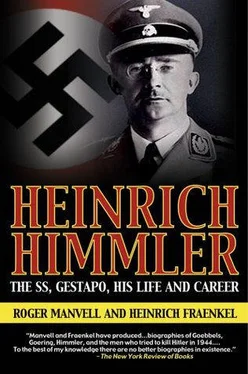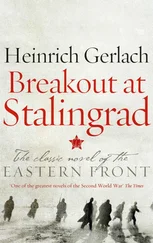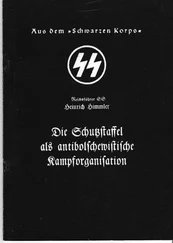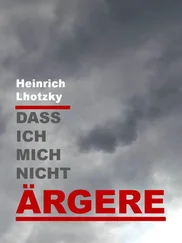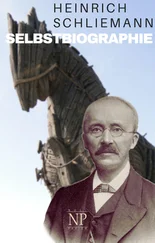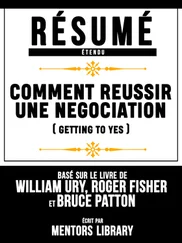Himmler’s place in this strange and ugly administration was still circumscribed on the one hand by Frick, the weak but obstinate bureaucrat who was Minister of the Interior, and on the other by the High Command of the Army, who disliked the continued existence outside their control of a quarter of a million men in S.S. uniform just as they had disliked the larger, but far less well disciplined forces of Roehm. As far as the bureaucrats were concerned, now that Goring’s attention was diverted from the political police in his pursuit of other interests, Himmler and Heydrich made short work of Frick and of Guertner, the Minister of Justice, both of whom sought during 1934-5 to restrain them and their agents in the S.S. and the Gestapo from seizing any person they wished and holding them in ‘protective custody’. Frick even attempted to draft a law, initially limited to Prussia, giving prisoners in the camps a right of access to the courts. When this draft was put on the agenda of the Prussian Ministerial Council by Göring, Himmler was invited to attend the meeting, though he was not a member of the Council, and he saw to it that the draft was rejected. His victory over Frick was complete, when on 2 May 1935, the Prussian court of Administration accepted that the activities of the Gestapo were outside their jurisdiction.
It was not, however, until 10 February 1936 that Hitler finally decreed that the Gestapo was a special police organization with powers that extended to the whole of Germany. The following June Himmler was made Chief of the German Police in the Ministry of the Interior, so confirming by right of decree what had been the practice for a considerable period owing to the absence of any effective opposition. Frick, though technically Himmler’s superior in police matters, gave up the hopeless task of attempting to interfere with him. 15
Another open critic of Himmler was Schacht, the banker, who was a ruthless and ambitious autocrat. Having been made Minister of Economics by Hitler, he was determined to conduct his affairs in his own way, though he was eventually to be superseded by Goring. Gisevius states that he went to Schacht’s residence and at his request searched it with an engineer for hidden microphones when the Minister suspected that Heydrich’s agents were spying on him and recording his sharp-tongued remarks; they found a microphone built into the telephone. Schacht in his memoirs, My First 76 Years, claims that Himmler had threatened him at the time he had accepted office, and had even gone so far as to tell him to resign; Schacht sent a curt message back that he would resign only when the Führer told him to do so and that the S.S. should keep out of his way.
The strategy adopted by Himmler and Heydrich against the High Command of the Wehrmacht was even more insidious and led up to the notorious cases against Blomberg and Fritsch early in 1938. Werner von Blomberg, Hitler’s Minister of Defence until he was dismissed in 1938 for marrying a prostitute without knowing of her police record, was ostensibly an enthusiastic supporter of Hitler. Blomberg was tall, white-haired and smooth-faced, a man with insufficient intelligence or guile to match the cunning of those determined to be rid of him. His effective opposition to the extensive militarization of the S.S. when conscription was introduced by Hitler in 1935 was sufficient to make Himmler his enemy.
Werner von Fritsch had been appointed Commander-in-Chief of the Wehrmacht in 1934 without Blomberg’s approval; indeed Fritsch and Beck, his Chief of Staff, who was later to be closely involved in the Army plot against Hitler’s life, were rumoured to be un-co-operative, and opposed to the introduction of conscription, though Hitler continued to have confidence in them. The rumours were instigated by Himmler, and Goring, who by 1935 wanted Command of the Army for himself, was by now prepared to take any suitable opportunity to denigrate both Blomberg and Fritsch. The atmosphere in Berlin vibrated with gossip about putsch and counter- putsch .
On 19 January 1935, Blomberg, as part of an attempt to restore friendly relations, invited both Goring and Himmler to address the High Command in the Kaiser Wilhelm Academy, but they used the occasion to make it clear to the Army that a military putsch would be illegal. Nevertheless Blomberg went even further in his efforts to appease Himmler; he invited him in the following month to address a gathering of Army officers in the Hotel Vierjahreszeiten in Hamburg. Conscription, though still unannounced, was already agreed and Himmler took his revenge on Blomberg by announcing that the S.S. in time of war would have to be increased in numbers to fight the enemy inside the frontiers of Germany while the Army fought abroad; in this event the S.S. could resist any treacherous stab in the back on the home front such as happened in 1918. As he spoke of the ideal men he had enlisted in the S.S., he seemed to be challenging the racial purity of the officers in his audience.
In January 1935 Blomberg had appointed Canaris as the Chief of Military Intelligence, the Abwehr, an office which Heydrich, who had carefully informed on Canaris’s predecessor, would have liked to absorb into the S.D., though this was hardly possible at the time. Thus began the uneasy relationship between Heydrich and his old naval instructor which covered the divergent political exploitation of their two Intelligence services. An initial working agreement, known as the Ten Commandments, limited Canaris’s operations to military and not political espionage. A superficially friendly social atmosphere was re-established, and Heydrich was able to relieve the tension once more by playing his violin in Canaris’s family circle. But the Admiral soon grew to fear Heydrich and his ultimate influence on Hitler and was prepared to receive secret information from such men as Helldorf, the Chief of Police in Berlin, about the activities of both Himmler and Heydrich.
Himmler’s interest was by now no longer limited to Germany. He thought of those Germans who lived abroad, and in 1936 came to terms with Ernst Bohle, head of the foreign organization of the Nazi Party, which was concerned with spreading Nazism among Germans outside the Reich and establishing whatever proved possible in the way of espionage by setting up agents for Heydrich’s S.D. abroad. Out of this intrusion into fields which, if they belonged properly to any department, were the concern of Canaris for Military Intelligence or of the Foreign Office, arose the curious incident of the Tukhachewski plot against the Stalin regime and the forged documents which Heydrich supplied to the Soviet government.
Marshal Mikhail Tukhachewski was at this time Deputy Defence Commissar of the Soviet Union, and had been in 1926 the principal Russian signatory of the protocols which had introduced German military experts into Russia. The story, as it has been reconstructed subsequently from statements and admissions by various men involved, 16seems to have been that Heydrich heard late in 1936 that Marshal Tukhachewski and other generals in the Russian High Command were planning a military putsch against Stalin. Two lines of action were possible to make use of this information; the first was to support the putsch, the other to see that knowledge of it reached Stalin in such a form that the largest possible number of Russian generals should be arrested and tried for treason. Canaris, who also knew of the plot, favoured the first line until a more opportune time came to use the second; Himmler and Heydrich wanted to exploit the second line of action immediately. Later Heydrich claimed that Hitler authorized the forging of documents by Behrens of the S.D. and a Russian political agent who was in the pay of the Germans. The ‘documents’ which were actually used as evidence in the subsequent secret treason trial in Moscow in 1937, bore the forged signatures not only of the Russian generals, but of the German officers with whom they were represented as being in touch. These papers were sold by Heydrich to Stalin through Russian agents. Stalin is said to have paid 3 million gold roubles for the evidence of his generals’ treason; but he marked the money, since he rightly assumed that it would be used by the Germans to pay their agents in Russia, and that this would enable the police to trace a number of S.D. spies. Later it also emerged that Stalin may well have planned the whole operation and made use of the S.D. to provide him with the evidence he needed to convict Tukhachewski and his associates.
Читать дальше
